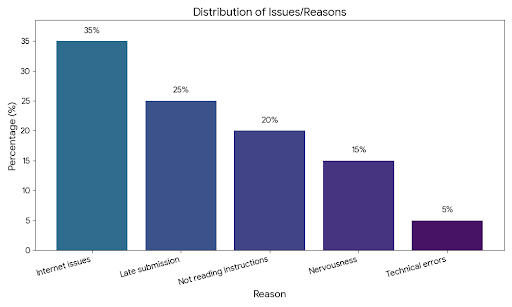Are You Ready for Online Exams at UK Universities

Exams don’t look the same anymore. Not long ago, students sat in big halls. Everyone had papers, pens, and sweaty hands. You could hear the sound of turning pages and pencil scratching. Now, things are not the same. You sit on your bed, open your laptop, and click on Start Exam.
No long walks to class. No waiting for question sheets. No invigilators walking around. Just you, your screen, and the ticking timer.
It sounds easy. But is it really? Many students in the UK say online exams feel strange. Sometimes the Wi-Fi drops, sometimes the screen freezes, and sometimes the camera makes you nervous.
Online exams save time and are here to stay. But they also need focus, planning, and calm. Because it is not only about what you know, but it is also about how you handle it.
So, you are ready for it?
Let’s discuss how online exams get started, what makes them unique, and what you can do to ensure you are ready when you say, “Your exam begins now.”
The Online Exams Shift You Didn’t See Coming
So, talking honestly, exams used to be sweaty palms, sounds of pencils, and long halls. But nowadays, it is all screens, keyboard typing, mouse clicking, and countdown.
Why? Because technology changed everything.
Let’s take a small story.
“I remember my first online exam,” says Sarah, a student from Manchester. “I was nervous not about the subject, but about my Wi-Fi!”
And that’s exactly what many students feel. It’s not just about knowing the answers anymore. It’s about knowing how to handle an online exam setup.
To see how fast this shift happened, look at this:
| Year | % of UK Universities Using Online Exams |
| 2018 | 25% |
| 2020 | 60% |
| 2023 | 85% |
| 2025 | 95% |

The pandemic was what brought these online exams, and even after things shifted back to normal, universities didn’t stop. Still, this shift comes with a question: are students really ready for it?
Because online exams don’t just test knowledge, they test focus, honesty, and adaptability too. And for this reason, many students turn to professionals for online exam help service.
The Difference between Online and Traditional Exams
Let’s compare both old and new school exams. Because while they both test your knowledge, the experience feels completely different.
Here’s a quick look:
| Feature | Traditional Exams | Online Exams |
| Place | Big exam hall | Anywhere (even your room) |
| Time | Fixed schedule | Flexible in many cases |
| Tools | Pen, paper | Laptop, camera, internet |
| Stress Level | High | Depends on setup |
| Cheating | Harder | Easier (but monitored) |
| Results | Take weeks | Often instant |
Now let’s make it real.
Tom, a student from London, once said:
“I used to love handwritten exams. But after my first online one, I realised how much time I saved.”
Lucy, another student, shared:
“Online exams make me more anxious. What if my Wi-Fi drops? What if my laptop freezes?”
And she’s right. Those fears are real.
That’s why understanding both sides’ matters before choosing what works best for you. Furthermore, you can ask Best Online Exam Help professionals for expert advice.
➢ Student Preference in 2024

Most students now prefer online exams. But preference doesn’t always mean comfort. The real question is, how prepared are you for this new style of testing?
Challenges Students Face in Online Exams
Let’s be honest, online exams sound easy. You’re home. You’ve got snacks nearby. You’re in your comfy chair. But then… your Wi-Fi decides to play hide and seek.
Sounds familiar?
You’re not alone. Thousands of UK students face the same issues every term. Here are a few common ones, and how you can handle them.
| Challenge | What Happens | How to Fix It |
| Poor Internet | Screen freezes mid-test | Use mobile data backup or test at a friend’s place |
| Tech Glitches | System crashes or a slow site | Restart, clear cache, test setup early |
| Distractions | Noisy room or notifications | Use quiet space, turn off phone alerts |
| Time Pressure | Hard to manage the online timer | Practice mock tests online |
| Cheating Accusations | AI tools or camera doubts | Always read exam rules carefully |
How Technology Is Changing Exams Forever
Let’s admit that exams are not the same as they used to be. Gone are the days of paper sheets and pens. Now all you have to do is log in, click the start button, and your test begins.
At first, it felt strange. But today, it’s the new normal. Most UK universities have already switched to online systems. Even big ones like the University of Leeds and University College London use them regularly.
Why? Because technology makes testing faster, fairer, and greener.
| Benefits of Online Exams | What It Means for Students |
| Instant Results | No more waiting weeks for grades |
| Auto-Grading | Objective scoring, fewer errors |
| Eco-Friendly | No paper waste |
| Accessibility | You can take exams from anywhere |
| Flexibility | Easier scheduling and re-takes |
But wait, there’s more to it than convenience. Technology is also helping professors understand how students learn. With online tools, they can track performance, identify weak areas, and provide more targeted feedback.
Let’s take an example. Suppose you keep getting stuck on “data analysis” questions in an online test. The system notices that, and your tutor gets an alert. Next week, they will send you extra exercises on that topic. That’s smart learning, right?
Of course, some students still miss the human touch. One student from Bristol said,
“I miss handing in my paper and chatting with my professor right after.”
That’s fair. But remember that online exams aren’t replacing learning.
They’re just helping it move forward.
➢ UK Universities Using Online Exam Systems (2020–2025)

Online vs Traditional Exams, Which One Wins?
Let’s talk about the big question, which is better: Online VS Traditional Exams? Students often debate this as if it were a football match. Some say, “Online exams are easy!” Others argue, “No, traditional ones are more real.”
Well, let’s look at both sides in simple words.
- Online Exams
You sit at your computer. You log in. The timer starts. You type your answers or choose options.
Sounds simple, right? It saves travel time. You can sit in your comfy chair, with your water and calm music. You don’t have to face the crowded halls and strict invigilation around.
But here is the other side.
What if your internet drops? What if your camera freezes right in the middle of your test? Yikes. Stressful, right?
- Traditional Exams
Now consider that old school method. You walk into a large room with rows of desks. Your bag stays outside. You get a pen, a paper, and the invigilator says, “You may start.”
You write by hand, cross out mistakes, and keep checking the clock. It feels more real, doesn’t it? But it’s also tiring because of long hours, tired hands, and slow grading.
So, what is the solution?
Neither is perfect. Each one has its perks and problems.
| Feature | Online Exams | Traditional Exams |
| Convenience | Take from anywhere | Must go to the exam hall |
| Time Saving | Fast setup | Takes longer |
| Tech Issues | Possible | None |
| Grading Speed | Instant | Delayed |
| Stress Level | Depends | Depends |
How to Smartly Prepare for Online Exams
So, online exams are going to stay here. But how to prepare for them? Here is how you can.
- Set Up Your Space
➔ Find a quiet spot.
➔ Make sure your laptop is charged.
➔ Close all tabs you don’t need.
➔ Keep water beside you.
➔ No pets or siblings running around.
Think of your desk as your mini exam hall. If it’s neat, your mind feels clear too.
2. Check Your Internet Early
➔ Don’t wait till the last minute.
➔ Test your Wi-Fi before exam time.
➔ If it’s weak, move closer to the router or use your phone hotspot.
➔ Tech issues can make you panic, so better to be ready.
3. Practice Mock Tests
➔ Most universities offer practice links. Use them.
➔ These small tests help you understand the real format.
➔ You’ll know how the timer works, where the buttons are, and how to submit safely.
4. Keep Your Notes Short
➔ Online exams often test your thinking, not your memory.
➔ So instead of long notes, write quick keywords.
➔ Stick them on the wall or save them in a doc (if allowed).
➔ Short notes help your brain recall faster.
| Study Tip | Why It Works |
| Make short notes | Quick to read and revise |
| Do one mock test daily | Builds speed and focus |
| Sleep early before the exam | Keeps your mind calm |
| Keep a backup internet option | Avoids last-minute stress |
5. Stay Honest and Calm
➔ Don’t try to cheat because systems can track it.
➔ Cameras, typing speed, and even your eyes, all get monitored.
➔ So just relax and focus.
➔ You know more than you think.
➢ Common Reasons Students Lose Marks in Online Exams (2024)

Conclusion
So here we are. Online exams are not a “maybe” anymore. They’re real, growing, and they’re not going away. Yes, they can feel scary sometimes. The Wi-Fi might drop. The screen might freeze. Your heart might race for no reason at all.
But online exams also make life easier in many ways. Students across the UK felt the same way at first. Then they learned how to set up their space, check their internet, and stay calm.
You’ll learn that too.
One student said something sweet after her exam:
“I was nervous the whole week, but the moment I started, I felt okay. I just needed to try.”